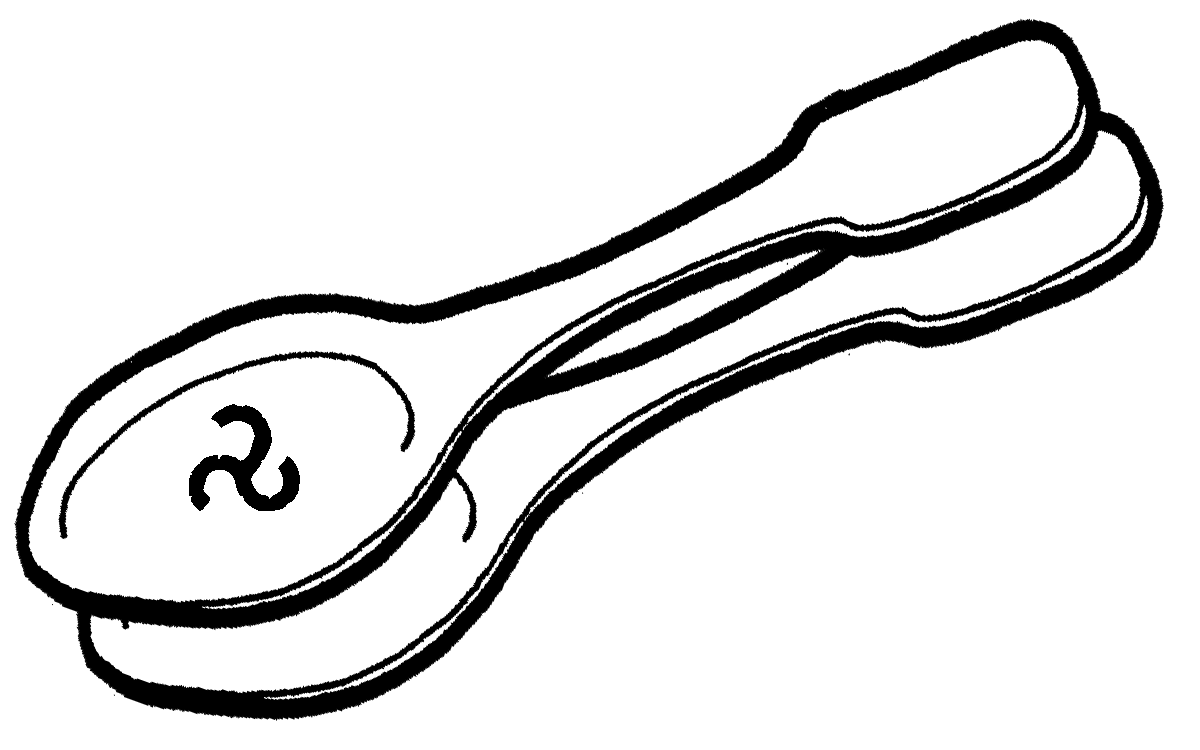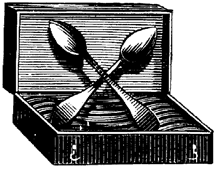
Stew Stansfield
Description
A set of six enchanted metal spoons of identical shape, each six inches in length. Each spoon is made of a different refined metal—aluminium, brass, copper, gold, lead and silver—and has a rune carved upon its bowl.
Cults
Associated—Donandar, The Trickster.Knowledge
Automatic; Few.History
Magical musical spoons are commonly associated with Donandar. Most stories suggest that, when all other musical instruments had been destroyed in the Great Darkness, the god of music used his talent for improvisation to perform a spoon-song of hope. An alternate myth ascribes their creation to Eurmal: the Trickster grew bored while listening to Lhankor Mhy drone on in Orlanth’s hall, and started playing a rumba with the utensils. Musical spoons are sacred to both cults.Quackjohn lost his spoons during one of the many attacks on Gringle’s Pawnshop. Except the tin spoon – he was eating soup with it at the time of the alarm, and kept it with him (which is why it’s not described here).
Procedure
Refined metal musical spoons draw upon the power inherent to each alloy or metal. It is not enough to simply enchant the metal, however: each spoon must be magically tempered. The aluminium spoon must be immersed in the source-waters of the Skyriver Titan. The brass spoon must be dipped in the mead of the Storm King’s hall. The copper spoon must be drenched in a Year King’s blood. The gold spoon must be plunged into magical lava, such as that found at Caladra’s Mouth. (n.b. A Death Lord’s breakfast of lava-porridge works just as well.) The lead spoon must be wet with the tears of a Mistress Race troll.Quackjohn is always on the lookout for a truestone spoon, but has never found one. (He’s now on the lookout for the rest of his spoons, too!) There are no iron spoons.
RuneQuest Powers
Each spoon acts as a spell matrix, holding a single spirit magic spell. When two spoons are played as a pair, the player can attempt to use both matrices – he must try to cast both spells, or neither. Playing one magical spoon and one normal spoon—or banging a spoon on another object—will not work. Only the greatest bardic heroes (Rune Priests of Donandar with a Musical Spoons skill of 90%+) can play two sets of spoons at once. The spoons work a little differently to normal spell matrices:- The chance of successfully casting a spell from a spoon is equal to the user’s Musical Spoons skill, rather than POW x 5. A single roll is made for a pair of spoons. If the player succeeds, both spells are cast; if he fails, neither is cast.
- Spells are cast by the spoons simultaneously. The player only counts the strike rank modifier of one spell (i.e. +2) when determining his SR, irrespective of the number of pairs of spoons he’s playing. The player still expends the usual number of magic points for successful or failed casts.
Spell Matrices:
Aluminium spoon  – Coordination 2 matrix. The targets’ limbs move with the grace and fluidity of Water. A fitting boon for jugglers, acrobats and purse-pinchers. – Coordination 2 matrix. The targets’ limbs move with the grace and fluidity of Water. A fitting boon for jugglers, acrobats and purse-pinchers.
|
Brass spoon  – Mobility 2 matrix. Affected persons move with the lightness of Air. A useful accompaniment for dancers, and comedians who misjudge their audience. – Mobility 2 matrix. Affected persons move with the lightness of Air. A useful accompaniment for dancers, and comedians who misjudge their audience.
|
Copper spoon  – Vigor 2 matrix. The power of the Earth flows through one’s bones and sinews. Puts life, zest and passion into a physical performance. – Vigor 2 matrix. The power of the Earth flows through one’s bones and sinews. Puts life, zest and passion into a physical performance.
|
Gold spoon  – Endurance 2 matrix. The targets are strengthened by the indefatigable energy of Fire. Aids long performances, particularly if the entertainers are wearing expansive and/or heavy costumes. – Endurance 2 matrix. The targets are strengthened by the indefatigable energy of Fire. Aids long performances, particularly if the entertainers are wearing expansive and/or heavy costumes.
|
Lead spoon  – Demoralize matrix. A pall of Darkness rises from the depths and casts its shadow over the soul. Great for accompanying scary stories and doom-laden tales. – Demoralize matrix. A pall of Darkness rises from the depths and casts its shadow over the soul. Great for accompanying scary stories and doom-laden tales.
|
Silver spoon  – Glamour 2 matrix. One’s voice and form is clad in the alluring enchantments of the Moon, darling. Fay. May not be appreciated at Vadruding gatherings. – Glamour 2 matrix. One’s voice and form is clad in the alluring enchantments of the Moon, darling. Fay. May not be appreciated at Vadruding gatherings.
|
Example:
Those baboons are making headway in their attack on Gringle’s Pawnshop, and Quackjohn (DEX 15, Musical Spoons 80%) has run out of crossbow bolts. Thankfully the duck had his musical spoons to hand, and spent the previous round selecting a suitable pair: the lead spoon and the copper spoon. Since the spoons are readied, his SR for this round is 5 (+3 for his DEX, +2 for the magic-point cost of one spell). Quackjohn starts up a dainty salsa with his magical spoons. Like any sensible duck, he’s hiding behind a posse of PC adventurers and reaches his SR untouched. He rolls 43. Success! Quackjohn expends four magic points (two for the Demoralize matrix and two for the Vigor 2 matrix). A wave of doom hits the baboons, but Gringle and his accomplices are newly envigored! Thoughts turn to the celebration of their impending victory – a game of snooker and a trip to the Ulerian temple sound good.HeroQuest Powers
Each spoon acts as a runic ability, with a rating equal to the hero’s Musical Spoons ability. Initiates and devotees of Donandar and Trickster cults may also use their Entertainment or Disorder rune affinities at a -6 penalty. If a hero has multiple appropriate abilities, he may use whichever is highest. No other abilities are applicable – not even at a penalty. In the hands of a character with Musical Spoons 6 and
and  Trickster 15
Trickster 15 , therefore, the spoons would have the following ratings:
, therefore, the spoons would have the following ratings:  9
9 (Water; aluminium spoon);
(Water; aluminium spoon);  9
9 (Air; brass spoon);
(Air; brass spoon);  9
9 (Earth; copper spoon);
(Earth; copper spoon);  9
9 (Fire; gold spoon);
(Fire; gold spoon);  9
9 (Darkness; lead spoon);
(Darkness; lead spoon);  9
9 (Moon; silver spoon).
(Moon; silver spoon).A spoon’s magic is typically used as an augment or an assist. A hero may attempt to use a spoon actively, but this should always count as a stretch. A Narrator may allow heroes to gain two augments from the spoons (instead of the usual one allowed), on account of the peculiar duality of the items’ powers. These are magical musical spoons, after all.
Value
Enchanted metals lose their properties when reforged, so these spoons are mainly of value to those who appreciate their musical capabilities. (On closer inspection, it seems that the person who manufactured Quackjohn’s spoons was a bit of a cheapskate. The gold, silver and aluminium spoons are actually tin, plated with more valuable metals. They still seem to work, however.) These spoons are worth many lunars or cows to a bard or Trickster. Quackjohn really wants his spoons back, too. He may be willing to trade one of his finest elfwood snooker cues in exchange.
Bad spoons! Bad!
Not all spoons work well together. Enchanted metals are associated with mythic entities and pantheons, many of which are engaged in conflict. The animosities between Fire and Darkness, and Storm and Moon, are particularly strong. A player attempting to combine the gold and lead spoons, or the silver and brass spoons, will unleash powerful magics. Other battles—such as those between Fire and Water—may also affect the spoons at the Gamemaster or Narrator’s discretion. The bronze and gold spoons do work together, but vibrate a lot and make quite a racket!Once paired, opposed spoons do magical battle. One spoon will be victorious. The effects of these conflicts are listed below. These effects are not common knowledge, but an inkling of the dangers should be apparent to those with common sense. If in doubt, don’t cross the spoons...







